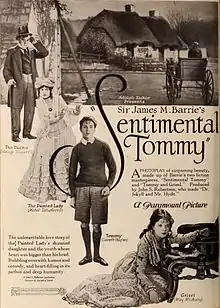Sentimental Tommy
Sentimental Tommy is a 1921 American silent drama film directed by John S. Robertson which has Mary Astor in one of her earliest roles, although her scenes were deleted before release. The story is based on James M. Barrie's novel. The film, which made a star of Gareth Hughes, is now considered to be a lost film.[1]
| Sentimental Tommy | |
|---|---|
 Advertisement | |
| Directed by | John S. Robertson |
| Produced by | Famous Players-Lasky |
| Written by | Josephine Lovett (scenario) |
| Based on | Sentimental Tommy by James M. Barrie |
| Starring | Gareth Hughes May McAvoy George Fawcett Mabel Taliaferro |
| Cinematography | Roy Overbaugh |
| Distributed by | Paramount Pictures |
Release date |
|
Running time | 75+ minutes at 8 reels (7,575 ft) |
| Country | United States |
| Language | Silent (English intertitles) |
Plot
As described in a film publication,[2] Grizel (McAvoy) is the daughter of the Painted Lady (Taliaferro), who believes that her lover will one day return. Grizel is ostracized by the other children of the town. Tommy Sandys (Hughes) and his sister Elspeth (Frost) come to the town. Tommy is friendly, but Elspeth keeps her distance. When the Painted Lady dies, Dr. Gemmell (Greene) makes Grizel his housekeeper.
Time passes and after the doctor dies, Grizel, who is now twenty-one years old, loves Tommy, who is an author in London. Tommy visits the town but cannot decide whether he loves Grizel. Grizel knows that Tommy does not love her, and after he returns to London her unhappiness leads to insanity. Tommy returns and marries Grizel, although he believes that she will hate him when she gets better. After two years under Tommy's care, she regains her sanity. After Tommy lets her know that he cared for her out of his love for her; not for pity, Grizel is happy.
Cast
- Gareth Hughes as Tommy Sandys
- Malcolm Bradley as Domino Cathro
- Harry Coleman as Cpl. Shiach
- Kate Davenport as Gavinia
- George Fawcett as Dr. McQueen
- Leila Frost as Elspeth Sandys
- Kempton Greene as Dr. David Gemmell
- Alfred Kappeler as The Little Minister
- May McAvoy as Grizel
- Mabel Taliaferro as The Painted Lady
- Virginia Valli as Lady Alice Pippinworth
- Mary Astor (scenes deleted)
Reception
The film received mixed reviews when it was released on May 29, 1921. The Minneapolis Morning Tribune expressed admiration for the film's acting. Calling out the director Barrie for directing this "very fine film"[3] and how the film expressed so much emotion. The article also stated that Hughes, the very famous Welsh actor, is a big hit with the fans.
According to The Philadelphia Inquirer, "there is the tender, elusive quality, the charm and the pathos, the humor, the quality which could bring one to tears while smiling."[4] The reviewer called the depiction of Tommy growing from a child to a man as "simply spectacular". Variety stated that the film must have been "a great pleasure"[5] to record a movie that is so fine and expresses admiration for how a book has been translated so finely to the screen. The author of the article talks about the character Tommy in his entirety of how he is a "profound character in this film particular."[5] Going into depth about how the movie was incredibly directed and spews about the actor who played Tommy, Gareth Hughes. People were infatuated with Hughes and liked his acting style in the movie for it portrayed the Tommy people knew and loved in the novel.
The Christian Science Monitor stated the film "respects its original novel that was printed years prior to the movie."[6] The author of the article states how Tommy's story is told with "numerous titles but, happily, they are written by someone with an active intelligence." The reviewer likened the film to The Four Horsemen, The Ole Swimming Hole, and Thrums of Long Island.
Sherwood, from Life Magazine gives a review of Sentimental Tommy with the pros and cons he lists. mentioning the director of the film whom is, John S. Robertson and states that throughout the film Robertson displays a "commendable degree of good taste throughout."[7] This "perfect interpretation"[8] of the novel leads him on to say how he was surprised how good the film turned out considering how unusual the settings in the novel were. The one thing that did bother Sherwood was the film was "far too long."[8]
Negative reviews included one that ran in The Minneapolis Morning Tribune, the headline stated: "Reviewer calls happy ending only real weakness of screen version."[9] Life ran an article expressing dissatisfaction with the top ten movies of 1921, Sentimental Tommy among them, explaining how an unwritten law has landed these "trendy movies" into the top.[9]
References
- Progressive Silent Film List: Sentimental Tommy at silentera.com
- "Sentimental Tommy: Has a Place Among Year's Best Pictures". Film Daily. Vol. 16 no. 3. New York City: Wyd's Films and Film Folks, Inc. April 3, 1921. p. 2. Retrieved March 18, 2014.
- "Diversion A-Plenty In The Motion Picture Theaters". The Minneapolis Morning Tribune. July 3, 1921.
- The Philadelphia Inquirer: 52. May 22, 1921. Missing or empty
|title=(help) - "Sentimental Tommy". Variety: 41. April 1, 1921.
- "Motion Pictures". The Christian Science Monitor: 11. May 4, 1921.
- Sherwood, Robert E. (December 29, 1921). "The Silent Drama". Life: 24.
- Sherwood, Robert E. (April 14, 1921). "The Silent Drama". Life: 540.
- The Minneapolis Morning Tribune. July 3, 1921. p. 45. Missing or empty
|title=(help)
External links
| Wikimedia Commons has media related to Sentimental Tommy. |
- Sentimental Tommy at IMDb
- Sentimental Tommy at AllMovie
- Still at silentfilmstillarchive.com